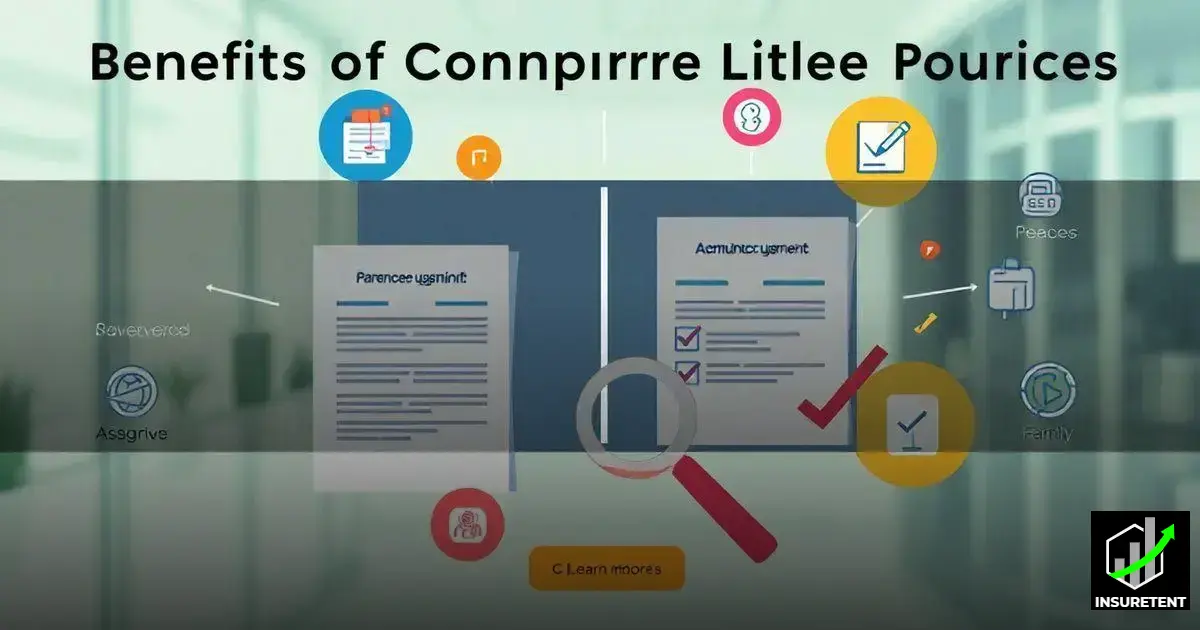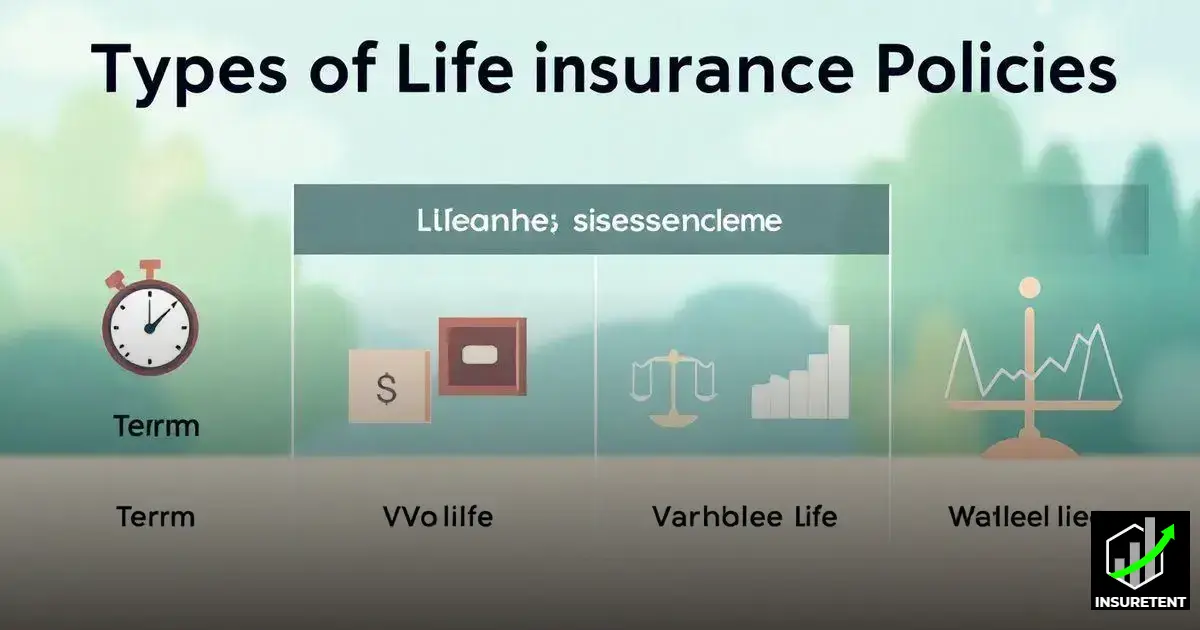Are you considering a life insurance policies comparison to protect your financial future? With various options available, selecting the right coverage can be overwhelming. Life insurance provides financial security for your loved ones, ensuring they are protected in case of unexpected events.
Understanding the differences between policy types, coverage amounts, and premium costs is essential. Some policies offer long-term security, while others provide flexible benefits tailored to your financial goals. A well-informed decision can help you maximize protection while staying within your budget.
How do you determine the best life insurance policies comparison for your needs? Exploring the key factors, comparing providers, and learning expert tips will guide you toward the right policy choice.
Understanding Life Insurance Policies
Making informed decisions about life insurance policies is essential for securing your financial future and providing protection for your loved ones. Life insurance serves as a financial safety net, ensuring that your family remains secure in the event of your passing. With various types of policies available, understanding their differences can help you select the best option for your needs.
Types of Life Insurance Policies
Term Life Insurance
Term life insurance offers coverage for a specific period, typically 10, 20, or 30 years. It is generally more affordable than permanent options, making it ideal for individuals who want financial protection during their working years when responsibilities like mortgage payments and child-rearing costs are highest.
Whole Life Insurance
Whole life insurance provides coverage for your entire lifetime as long as premiums are paid. It includes a cash value component that grows at a guaranteed rate, which policyholders can borrow against or withdraw if needed. This option is well-suited for those looking for long-term security and financial stability.
Universal Life Insurance
Universal life insurance offers flexibility, allowing policyholders to adjust their premiums and death benefits as their financial situation evolves. This adaptability makes it a suitable choice for those expecting changes in their income, expenses, or financial goals over time.
Choosing the Right Policy
When selecting a life insurance policy, key factors to consider include your age, health, family circumstances, and long-term financial obligations. A well-chosen policy ensures that your loved ones receive the financial protection they need while aligning with your budget and future plans. By understanding your options, you can confidently choose the coverage that best suits your situation.
Benefits of Comparing Life Insurance Policies

The benefits of comparing life insurance policies are numerous and can lead to significant savings. Many individuals overlook the importance of evaluating different options, but taking the time to compare policies ensures that you find the most suitable coverage for your specific needs.
Cost Savings
One of the primary advantages of comparing life insurance policies is the potential for cost savings. Different insurance providers offer varying premiums for similar coverage levels. By obtaining quotes from multiple companies, you can identify the most competitive rates and reduce your overall insurance expenses.
Tailored Coverage
Every individual and family has unique financial responsibilities. What works for one person may not be the best choice for another. Comparing policies allows you to assess specific features and benefits, ensuring that the policy you select aligns with your financial goals and coverage needs.
Better Understanding of Options
A comprehensive comparison gives you a clear understanding of the various types of life insurance, such as term, whole, and universal life insurance. This knowledge enables you to make informed decisions rather than settling for the first policy you come across. Being aware of the differences between these plans can also improve your overall satisfaction with your chosen policy.
Access to Additional Benefits
Some life insurance policies include hidden benefits or optional riders that enhance coverage. By comparing multiple plans, you can identify policies that offer valuable add-ons, such as critical illness coverage or waiver of premium benefits. Ensuring you don’t miss out on these options can provide extra financial security and peace of mind.
Comparing life insurance policies is a smart financial move that helps you secure the best coverage at the most competitive price. Taking the time to research and evaluate your options ensures that you make a well-informed decision that supports your long-term financial stability.
Types of Life Insurance Policies Explained

Types of Life Insurance Policies Explained are crucial for understanding your options when selecting a policy. There are generally three main types: term life, whole life, and universal life insurance. Each type has distinct features and benefits, suitable for different needs and lifestyles.
Term life insurance provides coverage for a specific period, typically ranging from 10 to 30 years. This policy is often the most affordable option, making it an excellent choice for those looking for temporary coverage, such as to protect a mortgage or support children until they become financially independent.
Whole life insurance offers coverage for the policyholder’s entire life, as long as premiums are paid. It also includes a savings component, known as cash value, which grows over time. This cash value can be borrowed against or withdrawn, providing financial flexibility in emergencies.
Universal life insurance combines the benefits of lifelong coverage with flexible premiums and death benefits. Policyholders can adjust their payments and coverage amounts as their financial situations change. This flexibility makes universal life insurance appealing for those who want control over their policy.
Choosing the right type of life insurance policy involves assessing your financial goals, obligations, and the level of coverage you desire. Understanding these types can help you make an informed decision that suits your individual needs.
How to Compare Life Insurance Quotes
How to Compare Life Insurance Quotes effectively is essential for finding the best policy for your needs. The process can seem overwhelming, but breaking it down into manageable steps can simplify your search.
First, gather multiple quotes from various insurance providers. Use online comparison tools or request quotes directly from companies. This will give you a clearer picture of the costs involved and allow for easy side-by-side comparisons.
Next, carefully examine the coverage options each policy offers. Not all policies are created equal, so check the details regarding the benefits outlined in each quote. Ensure you are comparing similar types of coverage.
Consider the premium payments. While it can be tempting to choose the lowest price, it’s important to evaluate the overall value of the policy. Cheaper premiums might come with less coverage or higher deductibles.
Additionally, assess the insurance company’s financial health. Look up ratings from agencies like A.M. Best or Standard & Poor’s to ensure you’re considering a reliable provider. A company with a strong rating is more likely to meet its future obligations.
Finally, pay attention to any additional benefits offered, such as policy riders or the option to convert term life insurance to a whole life policy later. These features can add significant value to your coverage and may influence your decision.
FAQ – Common Questions About Life Insurance Policies
What is life insurance?
Life insurance is a financial product that provides a monetary benefit to your beneficiaries upon your death, helping them manage expenses.
Why do I need life insurance?
Life insurance is important for providing financial security to your loved ones, covering debts, and ensuring their financial future in your absence.
What are the different types of life insurance?
The main types of life insurance include term life, whole life, and universal life, each with distinct features and benefits.
How do I choose the right life insurance policy?
Consider your financial obligations, compare different policies, evaluate premium costs, and assess the insurance provider’s reputation.
Is life insurance expensive?
Life insurance can be affordable, especially term life options. It is important to evaluate coverage needs to find a suitable policy.
Can I change my life insurance policy later?
Yes, many life insurance policies allow adjustments to coverage or premiums as your financial situation changes.
Check out our article on Business Insurance to learn how it can protect your business from unexpected risks and help you maintain financial stability.
